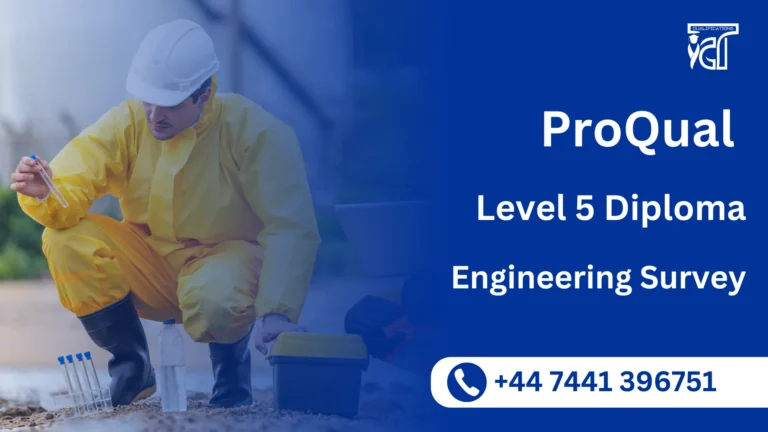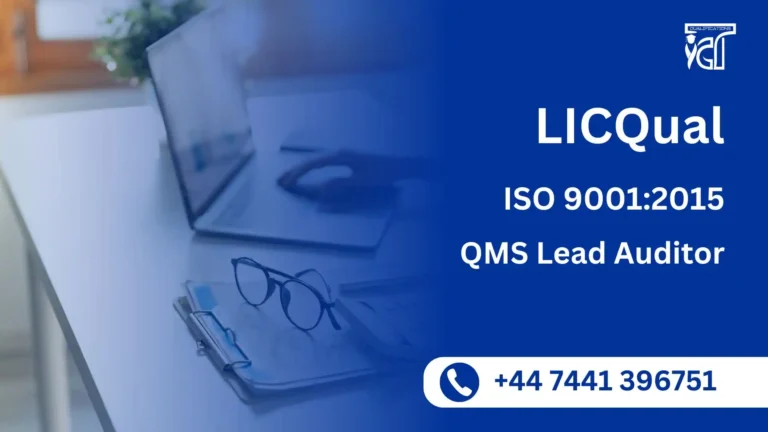The LICQual Level 5 Diploma in Learning and Development is a UK-accredited qualification designed for professionals seeking to enhance their expertise in workplace learning, training, and performance improvement. This diploma provides learners with advanced skills in designing, delivering, and evaluating effective learning programs that align with organizational goals.
Whether you are a trainer, HR professional, team leader, or aspiring learning and development (L&D) specialist, this course offers the knowledge and practical tools needed to drive professional growth and organizational success. By completing this qualification, learners will gain international recognition and establish themselves as skilled practitioners capable of supporting individuals and businesses through innovative learning strategies.
The LICQual Level 5 Diploma in Learning and Development focuses on developing the ability to plan, implement, and evaluate learning interventions across a wide range of professional contexts. Learners will explore areas such as instructional design, needs analysis, training delivery methods, and performance measurement. The program emphasizes practical application, ensuring that learners can directly apply their knowledge to real workplace challenges.
As an assignment-based course, it provides flexibility for professionals to balance their studies with career commitments. Graduates of this diploma will be equipped with the skills to manage learning programs, support workforce development, and enhance organizational performance. This qualification also serves as a strong foundation for further progression into senior L&D roles or advanced study in human resource management and leadership.
LICQual Level 5 Diploma in Learning and Development
The Study Units of LICQual Level 5 Diploma in Learning and Development are as :
| Unit Ref# | Unit Title | Credit | GLH |
| LICQ2200163-1 | Introduction to Learning and Development | 20 | 80 |
| LICQ2200163-2 | Learning Needs Analysis | 20 | 80 |
| LICQ2200163-3 | Instructional Design and Delivery | 20 | 80 |
| LICQ2200163-4 | Instructional Design and Delivery | 20 | 80 |
| LICQ2200163-5 | Talent Development and Management | 20 | 80 |
| LICQ2200163-6 | Performance Improvement Strategies | 20 | 80 |
GLH (Guided Learning Hours) and TQT (Total Qualification Time) are terms commonly used in vocational qualifications to help define the amount of time a learner is expected to spend on their studies.
1. GLH (Guided Learning Hours)
GLH refers to the number of hours a learner spends being directly taught, supervised, or supported during their course. This includes the time spent in activities such as:
- Classroom instruction
- Practical workshops
- One-on-one tutoring or mentoring sessions
- Online learning sessions with tutor support
In other words, GLH represents the time that learners are actively engaged with their instructors or learning activities.
2. TQT (Total Qualification Time)
TQT represents the total amount of time a learner is expected to invest in completing a qualification, including:
- GLH (Guided Learning Hours): Time spent on direct learning, as explained above.
- Self-Directed Learning: This includes time spent on independent study, research, assignment completion, preparation for exams, and any other work the learner does outside of direct teaching hours.
TQT is a broader measure that includes all the time required to achieve the qualification. It helps learners and employers understand the overall commitment required for the qualification.
Key Differences Between GLH and TQT:
- GLH focuses on direct learning with guidance or supervision.
- TQT includes GLH as well as independent study time and other learning-related activities.
Example:
If a qualification has a TQT of 600 hours and a GLH of 250 hours, it means the learner should spend 250 hours in direct learning (classroom, online, or tutor-led sessions) and 350 hours on independent study or research.
1. Introduction to Learning and Development
By the end of this unit, learners will be able to:
- Explain the principles, scope, and importance of learning and development in organizations.
- Analyze the role of L&D in improving workforce capability and organizational success.
- Evaluate different approaches to workplace learning and their application in diverse industries.
- Demonstrate understanding of professional standards and ethical practices in L&D.
2. Learning Needs Analysis
By the end of this unit, learners will be able to:
- Conduct a systematic learning needs analysis at individual, team, and organizational levels.
- Use data and evidence-based methods to identify performance gaps and training requirements.
- Develop recommendations for targeted learning interventions that align with organizational goals.
- Evaluate the effectiveness of learning needs analysis in supporting business objectives.
3. Instructional Design and Delivery
By the end of this unit, learners will be able to:
- Apply instructional design models to create effective training programs.
- Design engaging learning materials using a variety of tools and technologies.
- Deliver learning sessions using interactive methods suited to diverse learners.
- Assess learner engagement and adapt delivery techniques to maximize learning outcomes.
4. Talent Development and Management
By the end of this unit, learners will be able to:
- Analyze strategies for identifying and developing talent within organizations.
- Implement programs to support leadership development, succession planning, and career growth.
- Evaluate talent management practices to ensure workforce retention and engagement.
- Integrate learning and development initiatives with organizational talent strategies.
5. Performance Improvement Strategies
By the end of this unit, learners will be able to:
- Identify performance gaps and propose strategies for improvement.
- Develop performance management frameworks that support employee growth.
- Align performance improvement strategies with organizational objectives and culture.
- Evaluate the impact of L&D interventions on individual and organizational performance.
Course Benefits of LICQual Level 5 Diploma in Learning and Development
1. Globally Recognized Qualification
- Earn a UK-accredited diploma respected by employers and institutions worldwide.
- Strengthen your professional profile in the fields of training, education, and workforce development.
2. Advanced L&D Knowledge and Skills
- Gain expertise in learning needs analysis, instructional design, training delivery, and performance improvement.
- Develop the ability to create impactful learning programs aligned with organizational goals.
3. Enhanced Career Opportunities
- Unlock career progression in roles such as Learning and Development Specialist, Training Manager, or HR Development Professional.
- Increase your employability across diverse industries including business, education, healthcare, and public services.
4. Practical, Assignment-Based Learning
- Benefit from a flexible study approach with no traditional exams.
- Apply learning directly to workplace scenarios through assignment-based assessments.
5. Leadership and Talent Development Skills
- Learn to design strategies for talent management, leadership development, and succession planning.
- Contribute to organizational growth by building a skilled and motivated workforce.
6. Pathway to Higher Qualifications
- Use this diploma as a stepping stone to Level 6 and Level 7 qualifications in Learning and Development, HR, or Leadership.
- Build a strong foundation for postgraduate and professional certifications in the field
Ideal Learners for LICQual Level 5 Diploma in Learning and Development
1. Learning and Development Practitioners
- Professionals already working in training or workplace learning roles who wish to formalize and advance their skills.
- Individuals seeking an internationally recognized qualification to strengthen their career in L&D.
2. Human Resource Professionals
- HR officers and managers aiming to integrate learning and development strategies into workforce planning.
- Practitioners who want to enhance employee engagement, retention, and talent development through effective learning initiatives.
3. Trainers, Coaches, and Educators
- Corporate trainers, instructional designers, and coaches who want to improve their instructional design and delivery skills.
- Educators transitioning into the corporate or organizational training environment.
4. Team Leaders and Managers
- Supervisors and managers responsible for improving team performance through targeted learning interventions.
- Leaders aiming to develop stronger skills in talent management and succession planning.
5. Career Changers and Aspiring L&D Specialists
- Individuals looking to move into the learning and development field from related professions such as teaching, HR, or business management.
- Career changers who want to gain specialized skills in workforce training and development.
6. Consultants and Advisors
- Independent consultants seeking to expand their expertise in learning and development strategies.
- Advisors aiming to provide professional guidance on performance improvement and talent management.
Entry Requirements
Register Now
Qualification Process
Qualification Process for the LICQual Level 5 Diploma in Learning and Development
- Self-Assessment:
Begin by evaluating your eligibility to ensure you meet the qualification requirements, including work experience, knowledge, and language proficiency. - Registration:
Complete your registration by submitting the required documents, including a scanned copy of a valid ID, and paying the registration fee. - Induction:
An assessor will conduct an induction to confirm your eligibility for the course and explain the evidence requirements. If you do not meet the criteria, your registration will be canceled, and the fee will be refunded. - Assignmnets & Evidence Submission:
Provide all assignmnets and the necessary evidence based on the assessment criteria outlined in the course. If you are unsure of the required evidence, consult with the assessor for guidance on the type and nature of evidence needed. - Feedback and Revision:
The assessor will review your submitted evidence and provide feedback. Evidence that meets the criteria will be marked as “Criteria Met,” while any gaps will be identified. You will be asked to revise and resubmit if needed. - Competence Evidence:
Submit final evidence demonstrating that all learning outcomes have been met. This evidence will be marked as “Criteria Met” by the assessor once it is satisfactory. - Internal Quality Assurance (IQA):
The Internal Quality Assurance Verifier (IQA) will review your evidence to ensure consistency, quality, and compliance with standards. - External Verification:
The IQA will submit your portfolio to LICQual External Quality Assurance Verifiers (EQA) for final confirmation. The EQA may contact you directly to verify the authenticity of your evidence. - Certification:
Upon successful completion of all checks, LICQual will issue your official certificate, confirming that you have attained the LICQual Level 5 Diploma in Learning and Development






